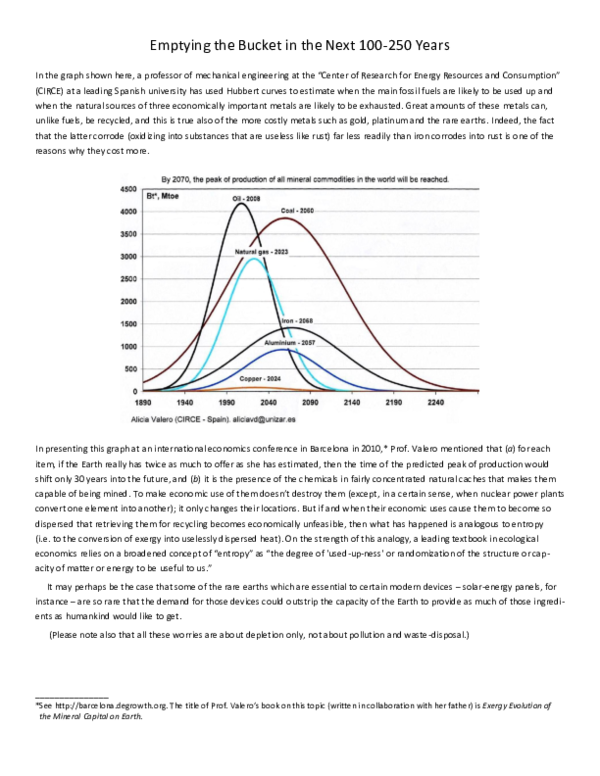Academia.edu no longer supports Internet Explorer.
To browse Academia.edu and the wider internet faster and more securely, please take a few seconds to upgrade your browser.
Exhaustibles countdown
Exhaustibles countdown
Related Papers
In recent years, the field of environmental management of industrial activities has been causing a great interest among scientists. This paper discusses the notion of en-tropy and the relationship of entropy to environmental management of industrial activities. In the paper, two case studies of Eco-Industrial Networks are presented: the case of aluminium and that of copper. The analysis of case studies made clear, firstly, that the production of aluminium or copper by recycling new scrap generates significantly less specific entropy than the production of the same product from primary raw materials and, secondly, that the effort of closing the loops of material flows aiming at complete recycling leads to higher generation of specific entropy than those which correspond to the use of primary raw materials. It is proven that there exists an entropy limit of environmental effectiveness when recycling each product. The present paper comments on this limit.
Every production-recycling iteration accumulates an inevitable proportion of its matter-energy in the environment, lest the production process itself would be a system in perpetual motion, violating the second law of Thermodynamics. Such high-entropy matter depletes finite stocks of ecosystem services provided by the ecosphere, hence are incompatible with the long-term growth in the material scale of the economic process. Moreover, the complex natural systems governing such stocks respond to depletion by possibly sudden environmental transitions, thus hindering markets' very ability to adapt to the new equilibrium conditions. Consequently, uncertainty of critical resilience thresholds constrains material economic growth.
[FIRST PARAGRAPH] Discussions on the future availability of both fossil fuel energy and minerals important to modern economies are sharply polarised. There are those who see limits approaching for fossil fuel use and minerals availability, as well as for ecosystem services such as fresh water and pollution absorption capacity provided at no cost by nature. Richard Heinberg [31], in a book of the same title, argued for ‘Peak Everything.’ This view was most famously put forward in the 1972 book ‘Limits to Growth’ by Donella Meadows and others [45]. There are many more recent ex-ponents of this view (see eg [6, 18, 33, 60]).
This paper presents a thermodynamic vision of the depletion of mineral resources. It demonstrates how raw materials can be better assessed using exergy, based on thermodynamic rarity, which considers scarcity in the crust and energy requirements for extracting and refining minerals. An exergy analysis of the energy transition reveals that, to approach a decarbonized economy by 2050, mineral exergy must be greater than that of fossil fuels, nuclear energy, and even all renewables. This is because clean technologies require huge amounts of many different raw materials. The rapid exhaustion of mines necessitates an increase in recycling and reuse, that is, a “circular economy”. As seen in the automobile industry, society is far removed from closing even the first cycle, and absolute circularity does not exist. The Second Law dictates that, in each cycle, some quantity and quality of materials is unavoidably lost (there are no circles, but spirals). For a rigorous recyclability analysis...
Philosophical Transactions of the Royal Society A: Mathematical, Physical and Engineering Sciences
Material efficiency: rare and critical metals2013 •
Ecological Economics
Entropy law and exhaustion of natural resources Is Nicholas Georgescu-Roegen's paradigm defensible?1990 •
RELATED PAPERS
Journal of Education and Practice
Self-Efficacy of Filipino Senior High School Students: Differences Among Tracks/Strand and Type of School2019 •
2023 •
Psihologie, Revistă ştiinţifico-practică
Stresul posttraumatic – consideraţiuni și reflecţii psihologice2013 •
Matériaux & Techniques
Développement de structures composites intelligentes2009 •
Tamkang Journal of Mathematics
Monotonicity of sequences involving generalized convexity function and sequences2015 •
Patient Preference and Adherence
Medication Adherence Among Hypertensive Patients Attending Different Primary Health Centers in Abha, Saudi Arabia: A Cross-Sectional Study2022 •
1986 •
International Journal of Environmental Research and Public Health
Work Ability among Upper-Secondary School Teachers: Examining the Role of Burnout, Sense of Coherence, and Work-Related and Lifestyle Factors2020 •
Journal of the American Chemical Society
Ligand-Dependent Colloidal Stability Controls the Growth of Aluminum Nanocrystals2019 •
Regular and young investigator award abstracts
320 Phase IIa study of alpha-DC1 vaccine against HER2/HER3, chemokine modulation regimen and pembrolizumab in patients with asymptomatic brain metastasis from triple negative or HER2+ breast cancer2020 •
2015 •
Journal of Foot & Ankle Surgery
The Medial Plantar Artery Flap: A Series of Cases over 14 Years2012 •
8 INTERNATIONAL CONFERENCE ON APPLIED RESEARCHES IN SCIENCE AND ENGINEERING INSTITUTION OF ENGINEERING AND TECHNOLOGY OF LONDON
Risk Management in Construction Projects Utilizing Alternative Project Delivery Methods2024 •

 Mark Lindley
Mark Lindley